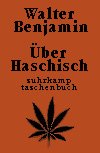TyG - 9/19 - Mo' post-PoMo postings. . .http://www.blogger.com/img/gl.link.gif
A slight light bulb went off above my head recently, as I googled my way through internet "wisdom" and discovered this:
 That's right, folks -- our own dear "aura" counselor, Walter Benjamin, also wrote this interesting treatise on his personal encounters with hashisch-rausch ("hashish-rush," see below*) http://www.wbenjamin.org/story.html
That's right, folks -- our own dear "aura" counselor, Walter Benjamin, also wrote this interesting treatise on his personal encounters with hashisch-rausch ("hashish-rush," see below*) http://www.wbenjamin.org/story.htmlNow, don't misunderstand where I'm going with this; as a "product of the 70's" myself, I am NOT claiming that Ben-ya-meen was "under the influence" and unable to clearly communicate. I am suggesting, however, that for me to grok what this critic, perhaps any of these critics, have to say, I may have to adjourn to a coffee shop in Amsterdam somewhere and pick up where I left off during the Nixon years.
I, too, found helpful our class analysis of the praxis (practice, as distinguished from theory; application or use, as of knowledge or skills; www.dictionary.com) of postmodernism as seen in the McD photo and "She Looks Like a Model." I think I'm MUCH more of a visual and hands-on learner than a reader-learner, and digging through the barnyard of our texts is leaving me gasping for air. So the picture-texts were very helpful in understanding things like "art separated from ritual" (McD's Golden Arches logo,) "urbanization" (the whole photo; McD, cars, cigarette adverts, powerlines, and one almost totally hidden human being,) and "culture of distraction" (life is SO BUSY we eat our facsimile food in our cars-as-homes while thinking about work/school/family and paying NO attention to the slop we're ingesting or what's going on around us.)
When Dr. (not) Rog mentioned casually having read the Adorno (yes, and Horkheimer) 30+ pages twelve times during the week, while also traveling to NYC, I thought I'd choke -- it's still all I can do to slog through once, frantically underlining things that strike me as I go (though this week I did make it through Benjamin a second time since class, and got about 20 pages into H & A as a review.)
Perhaps I'm just too distracted by our postmodern culture and my cluttered home and my overtaxed life to properly apply myself to the truth and wisdom inherent in the thinking of the great philosphers to whom we are being exposed (exposing ourselves?). It is interesting, to say the least, to be reading a plain-jane, black-and-white TEXT BOOK to study postmodernism. A "show-me, touchy-feely" brain like mine would be much better served by a multi-media "text" like a website with visuals, sound, etc. (maybe that's someone's doctoral dissertation -- not mine). Perhaps with a jigger of absinthe to help it all process. . .
*A small clip from the site about the German word rausch:
1] Translator's Note: The German word "Rausch" has only recently been adopted in English speaking countries as rausch and may still be unfamiliar to some readers. Etymologically speaking, the English cognate is "rush," and a number of important works on Benjamin, e.g. Susan Buck-Morss's Origin of Negative Dialectics have so translated this word. Buck-Morss has also translated rausch as "high." Edmund Jephcott has translated the word as "trance," but this is a more accurate translation of the German word "Entrückung" and fails to capture the essential characteristics of "whirling, swirling, buzzing and thundering" which seem particularly appropriate when "Rausch" is used in an adjectival form such as "rauschendes Wasser" [rushing water]. Werner Dannhauser has even translated "haschisch-rausch" as "hashish trip". Despite the etymological correctness of the English "rush," the numerous slang connotations of this word and its frequent use to describe the sensation of velocity experienced in amphetamine-like substances have led us to opt for the German original, and we have found precedents in scholars like Margaret Cohen, whose Profane Illumination has preserved the original as well. Benjamin scholar, John McCole has astutely presented the case for this usage in his Walter Benjamin and the Antinomies of Tradition. "'Rausch' is far more suggestive than the English equivalent 'intoxication': it quite naturally bears the connotations of such overwhelming feelings as exhilaration, ecstasy, euphoria, rapture, and passion; its onomatopoetic qualities have an equivalent in the slang term 'rush'. 'Intoxication' is the only real option for rendering "Rausch" in English, but its strong associations with alcohol and toxicity can be misleading. Benjamin referred to it to refer to various states of transport. . ."
"This class makes me tired and pissed off and just a little scared to drive down the road." Right-on, AS, though it's not the class for me, it's the subject...

1 Comments:
Didn't know this about Walter. Think he's where the term "bennies" came from too?
Post a Comment
<< Home